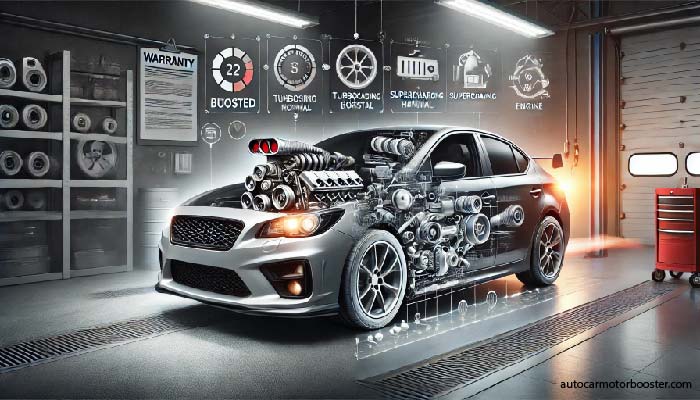
“Boosting” is a popular term in the automotive world, often associated with performance enhancement. Whether you’re an enthusiast looking for that extra power or just want to elevate your vehicle’s responsiveness, boosting offers an exciting path. However, the critical question for many car owners is, how does boosting impact my car warranty? This article will break down the pros and cons of boosting, how it affects warranties, and what to consider before enhancing your car’s performance.
What is Boosting?
Boosting refers to any modification that increases a car’s horsepower, torque, or overall engine performance. Common methods include turbocharging or supercharging engines. Although boosting offers significant performance gains, it can also stress your car’s internal components, raising questions about reliability and longevity.
The Appeal of Boosting
The allure of boosting is clear: faster acceleration, increased horsepower, and an enhanced driving experience. Boosting can make a vehicle feel sportier and more powerful, which appeals to both performance enthusiasts and casual drivers alike. Many who opt for boosting enjoy the thrill of a more responsive vehicle.
Types of Boosting and How They Impact Warranties
There are several types of boosting, each with unique implications for a car’s warranty.
- Turbocharging: Adds an extra air compressor to the engine to improve efficiency and power.
- Supercharging: Uses a belt-driven air compressor for a significant power boost.
- Engine Tuning: Adjusts the engine’s control unit (ECU) for optimized performance.
While these methods can dramatically increase power, they also may affect the car warranty. Many warranty providers specify that modifications, especially those that increase engine stress, void warranty coverage. For instance, adding a turbocharger could stress the transmission and other parts, potentially leading to failures that the manufacturer warranty won’t cover.
How Boosting Impacts Warranty Coverage
The implications for car warranties depend largely on the extent of modification and the type of warranty policy in place. Here’s how boosting could impact different areas of a warranty:
- Powertrain Warranty: Most powertrain warranties are voided by modifications like turbocharging, as these enhancements put added strain on the engine, transmission, and related components.
- Factory Warranty: Some factory warranties are less forgiving when it comes to aftermarket modifications. Any substantial performance boost often means voiding this warranty.
- Extended Warranty: While aftermarket or extended warranties offer some flexibility, modifications such as boosting might lead to claims being denied.
Always check your warranty terms closely before proceeding with any enhancements to avoid unwanted surprises down the line.
Manufacturer Policies on Boosting
Major automakers have varying policies on modifications. While some may offer warranties on specific performance packages or tuning kits, most explicitly mention that any aftermarket modification could nullify warranty protections.
It’s worth noting that companies like BMW, Ford, and Mercedes-Benz offer performance kits covered under warranty. However, these kits are typically less aggressive than aftermarket modifications and are specifically designed to maintain vehicle integrity without compromising the factory warranty.
Financial Implications of Boosting on Warranty
When a warranty is voided due to boosting, any repairs associated with the modification become the responsibility of the vehicle owner. If boosting causes engine or transmission failure, you could face significant repair costs. A voided warranty may increase repair expenses, as costly repairs, including engine replacements, are no longer covered.
Making an Informed Decision on Boosting
Before committing to boosting, consider the following:
- Check Warranty Terms: Review the fine print in your car warranty agreement to understand which modifications may void coverage.
- Consult with Authorized Dealers: Some authorized dealers offer modifications that won’t void the warranty.
- Research Warranty-Friendly Options: Certain warranty-friendly modifications can still improve performance without impacting coverage.
Frequently Asked Questions (FAQs)
Q1: Does boosting always void my car warranty?
A1: Not necessarily. Some manufacturers provide options for performance upgrades that are covered under warranty. Always check with your dealership or warranty provider before proceeding.
Q2: What modifications are typically safe for warranties?
A2: Modifications like cosmetic upgrades or non-performance-enhancing parts usually don’t affect warranties. However, anything impacting the engine, transmission, or powertrain could void it.
Q3: Can I get an aftermarket warranty that covers boosted vehicles?
A3: Yes, some aftermarket warranties cater specifically to modified or boosted vehicles. Research companies that provide this specialized coverage.
Q4: Will an extended warranty cover my boosted vehicle?
A4: Most extended warranties do not cover performance-enhancing modifications. However, some warranties designed for modified vehicles may offer limited coverage.
Q5: Are there boosting options that don’t affect warranty coverage?
A5: Some manufacturers offer dealer-installed, warranty-approved performance kits that provide a boost without voiding the warranty. Ask your dealer about these options.
If Like This Article Visit Our Website. Collect From Wekiapedia